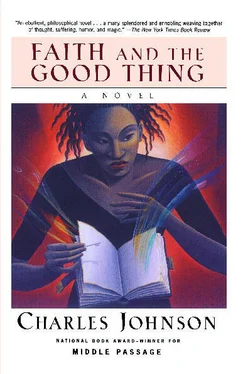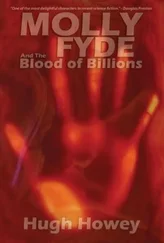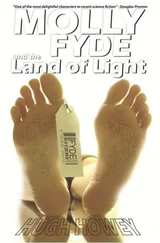All right.
Rising to a sitting position slowly, as if someone had replaced her spine with a two-by-four or ridden her on all fours, Faith saw the twenty-dollar bill on the bed. She reached for it, then drew back her hand, aware of a sharp ache all through her body, particularly her legs, thighs, and sore abdomen. She swung her legs over the side of the bed and hobbled to the sink, where she washed herself, then smoothed down her dress. She rested against the sink, her head bent into its bowl. With the twenty dollars she could attempt to return home. What awaited her there? — an empty farmhouse, the self-satisfied smirk of Reverend Brown?
No.
She raised her head and peered into the cracked glass of the mirror above the sink. “Nice-looking,” she whispered to her reflection, “. cute.” She had twenty dollars. She knew, without further thought, how to get more.
Children, Fate put a terrible hurt on this sweet sister. So hungry was she before her first big break, in the form of the man called Barrett, that her backbone could have shaken hands with her stomach. Yeah. The soles of her shoes were so thin she could step on a dime, then tell you if it was heads or tails. She was so poor — you ready? — she couldn’t even pay attention.
Faith grew weak, and so thin her eyes looked as hungry and haggard as those in a kraken’s skull; her figure, once the rich color of café-au-lait, became ashen and harried from drugs, lots of gin, and the endless parade of people who appeared at her room in Hotel Sinclair. Before Barrett came she even tried religion and, failing in that, tarried there restlessly during the long rimy months of winter, her days not like days at all but akin, she fancied, to sausage links, each flat and bland and tasteless, arching away from her, and filled the day long with the interminable disquietude of her mind’s revolutions. At dawn Faith damned the day, and called on night; at dusk, she rued the night, and pined for day. “Perhaps,” she told herself at forenoon in her tiny room, “we can be what we think we are,” but by eveningtime she knew; “We are nothing, nothing at all.” There was no truth, no certainty save the fact of her life’s fall into bondage, no reality but that of the endless procession of unhappy humanity that arrived, by and by, at her door. How they came to know of her condition and exploit it, she knew not. They did. They knew. They saw — in her eyes, in the slow, uncertain way she gestured and spoke, that in her ethical pother they could, if they tried, place her at their behest. She walked the city’s winding streets, smoking reefers, thinking, and, before long, encountered on a lightless street corner, or in a tavern or club, soft raptorial eyes with swelling irises upon her. The struggle began. She saw a face, a human form, perhaps a smirk, and knew that he who watched her was, in some strange, inexplicable yet natural way, taking hold of her life. Looking away, back to her table or at a menu, she felt she was Faith Cross with such-and-such possibilities; but when those eyes fell upon her, imagining her reclining on the backseat of a car parked in the woods, or sprawled on the covers of a bed in some musty two-dollar-a-night hotel, she became that and was nothing more. What that other mind thought of her she was: you could not deny it — you railed, fought it, but those eyes saw you, in part, as what you were or might be. Faith fought back, denying this transformation, and — as always — lost.
It happened often. Every day before Barrett tried to set her straight. She was wholly herself only when alone, locked in her room, or traveling the quiet city streets. As soon as another appeared the struggle began anew: to Mrs. Octavia Beasley she was monthly rent, to Arnold Tippis, a huge car to hear his woe. Faith fancied that these folks found this pleasing; in a world wracked by the incessant war of billions of wills, it satisfied some ancient need to have completely, if only for an hour or an evening, a life in one’s power — the other’s, if not one’s own: to be no longer in bondage, the object of an alien will, and forever manipulated and ruled, but to be — if only in illusion — completely effective, to rule with suzerainty over their soft, compassionate, coffee-and-cream-colored Faith.
She laughed; really laughed. Because she’d learned, through many reversals and indignities, what she took to be a lesser secret of life. It was in no way profound, and certainly neither universal nor necessary — she had, in fact, heard it before: you are nothing. Yet what she had to be for others changed that for them. In her presence their worlds snapped somehow into perfect focus, it shaped itself around them, and they stood free and independent at its center, commanding, deigning, and having their wills obediently done. She accepted her bondage and bolstered herself the day long with denial: “I am not what I am,” for there was a fear, a nagging suspicion, if not a certainty, that what she did, through her own will or coercion, would not bring her a momentary descent into shame but make for her a destiny. Should she die tomorrow of a heart attack, or beneath the wheels of a car, people wouldn’t say, “Faith Cross, daughter of Todd and Lavidia, the quester for the Good Thing, has died.” No, they would smirk and say, “Death sneezed the whore.” She had suffered more beatings, near evictions, insults, and threats in four months than she cared to recall; but the worst, the most denigrating service her situation demanded she render was simply listening. Listening to the secret thoughts only one such as she could be called upon to bear. It gave her headaches so violent they seemed to sunder her mind into two equal, warring halves: one heavy with the amaranthine, inviolable awareness of her autonomy and unsullied faith; the other a consciousness caught within the mad swirl of a personal history over which she had no control. Others wrote it. It was etched in by each cramp of hunger in her stomach and, thence, sent her back onto the wintry city streets to eke out survival. There was no surcease to the struggle of feeding herself and fighting what others thought her to be. To survive, she sold them, not only herself, but her father’s stories of the South.
On Saturdays, a Mr. Jonathan Crowell always punctual, appeared at her room. Faith, on his last appearance, opened the door and stood staring into Crowell’s sea-colored eyes, struggling to combat the wave of control overcoming her. Crowell, square-jawed and chubby with thin sienna hair, would smile — it overwhelmed her, as certain smiles are wont to do. Her will began to fold; Crowell entered and, after flipping back his blue coattails, lowered his weight onto her bed. He, she could tell, was like all the others: certain of their power over her, yet blind to the bonds that such power brought. He withdrew a billfold from his pocket, a dollar from the billfold, and laid it on her wrinkled pillow, thinking, as he pulled off his shoes and unbuttoned his shirt, that he was in control.
“Give me some sugah.” He pursed his pale lips.
Faith closed her eyes and kissed Crowell, contemptuous of him as he leaned forward, lowering his head to say, “Tell me. something nice. ” He always asked that; like the rest, he could not get his fill of her tales. Thus, her power in bondage. Though Faith hated selling her favorite stories so cheaply, she came up with one Big Todd told her when she was only three and always fighting with other children, always contesting her will against theirs, then wailing when, due to her frailty, the others won. “If you think there’s ever a winner or a loser,” he said “you’re dead wrong.” No, Faith thought, this tale is too dear to sell. But, looking at Crowell and seeing his self-confidence, it was evident he needed this. She began.
Читать дальше












